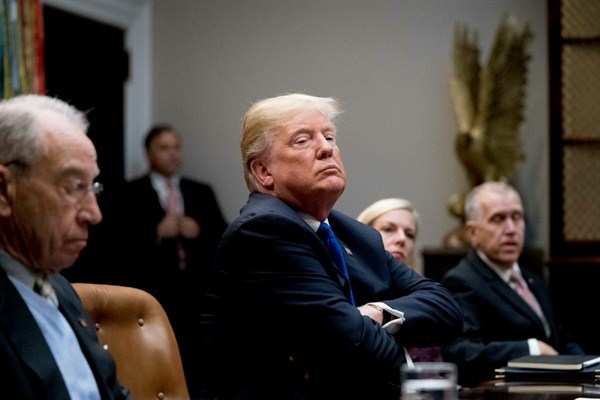As the first anniversary of his inauguration approaches, U.S. President Donald Trump has shown no sign of altering his provocative and destabilizing approach to diplomacy. His unpredictability and inflammatory rhetoric have spread confusion about the White House’s intentions in many cases, while diverting attention from the substance of Trump’s policies in others. In this special report, WPR has collected 10 articles assessing how Trump has broken with the traditions of the U.S. foreign policy establishment and where his “America First” agenda has had the biggest impact.
Purchase this special report as a Kindle e-book.
More Bark Than Bite
Trump May Threaten a Trade War Over NAFTA, but His Options Are Limited
Back in February, Edward Alden explained that Trump actually holds minimal leverage in following through on his campaign promise to renegotiate NAFTA. Trump is more likely to settle for minor changes and declare victory than he is to overhaul the deal in any significant way—an approach that avoids the risk of a damaging trade dispute.
Without admitting it, Trump has largely embraced former President Barack Obama’s military strategy in the Middle East, WPR columnist Steven Metz argued in April. The most prominent exception was the one-off strike in Syria that Trump ordered in response to a chemical attack against civilians by the regime of Bashar al-Assad.
In June, Trump caused a stir by announcing he was “canceling the last administration’s completely one-sided deal with Cuba.” But what Trump really meant by this, according to William LeoGrande, was that he was repudiating Obama’s decision to abandon the goal of regime change in Havana.
Trump’s Afghanistan strategy, unveiled last summer, emphasizes a “new” regional approach that he claims will finally produce better results. But as Anubhav Gupta wrote in September, it is unclear how new the approach really is, whether the administration will follow through, and if it is prepared to grapple with the ramifications.
Changing Course
In a column on the eve of Trump’s inauguration, WPR’s Frida Ghitis examined Trump’s curious courtship of Russian President Vladimir Putin, as well as the broader allegations of his links to the Kremlin. The investigation into Russian involvement in the 2016 campaign will carry on into 2018, with likely domestic and international repercussions.
Trump’s so-called travel ban fits within his broader push to implement a valueless, transaction-based foreign policy. WPR columnist Ellen Laipson argued last January that the move to block entry to the U.S. for refugees and travelers from Muslim-majority countries would likely lead to more radicalization and shrink U.S. soft power.
Trump’s protectionist “America First” trade policy—a sharp departure from America’s role as a pillar of free trade—has stoked significant fear about the prospect of a global trade war. David Talbot explained in June how Trump’s decision to withdraw from the Paris climate agreement could turn that fear into a reality.
In December, Trump broke with longstanding U.S. policy by unilaterally recognizing Jerusalem as the capital of Israel. WPR associate editor Omar Rahman wrote that Trump’s decision will damage prospects for peace in the Middle East, while undermining international law and setting a destructive precedent for the future of diplomacy.
The Battles to Come
North Korea Tops Trump’s Agenda in Asia. But Can He Deal With the Geopolitics?
North Korea loomed large over Trump’s tour of Asia in November. While the trade debate and Trump’s relationship with Chinese President Xi Jinping are no doubt important, Pyongyang’s nuclear and missile threats raise the biggest stakes for regional and global security and will continue to dominate Trump’s agenda in his second year in office.
The Trump administration should take heed of the economic pitfalls of abandoning the 2015 nuclear deal with Iran, Neil Bhatiya warned in August. If Congress votes to reimpose sanctions, Washington must be prepared to go it alone. Iran will fight new sanctions and can rely on its European and Asian oil customers to back it up.

